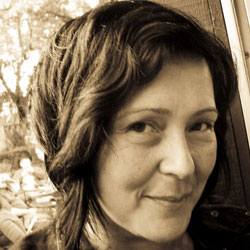January long light
Janus I see you
God of locks and doorways
two-faced looking in Capricorn
Capricious like the snowy owl
irruption
We fear heavy body collisions
January time of doors
time looking back on itself
God of gates
spelt and salt
They say when you
walk through a door
you can forget what
you came for
Notes on the Poem
Once again, our Poem of the Week choice spotlights work from the 2017 Griffin Poetry Prize shortlist. This week's selection comes from Hoa Nguyen's vibrant collection Violet Energy Ingots. Among its many fascinating attributes, how Nguyen refashions language, often swiftly over the course of a brief poem like "January", is simultaneously an exhilarating pleasure and an inviting challenge to the reader. "January" offers subtle word shifts in its succinct 15 lines, including January / Janus, Capricorn / capricious and spelt / salt. "The slippages in language" is the rather lovely way the 2017 judges characterize this method Nguyen uses with captivating regularity throughout this collection. How that method gently connects words within the poem captures both how language evolves and how we react to what that language denotes and connotes. The name for the first month of the calendar year comes from the Latin "Ianuarius" named after the Latin word for door (ianua). From that same root comes Janus, the god of beginnings and transitions, as symbolized by gates, doors, doorways and openings. In essence, the month of January is both the start of the new year and as it is celebrated in many traditions, is the opening to new beginnings. In the closing lines of her poem ... "They say when you walk through a door you can forget what you came for" Nguyen tweaks the idea of being hopeful as one goes through a door with just the shadow of a doubt, that voluntary or involuntary memory loss might attend what is supposed to be a positive moving forward. Just as she deftly shifts words, she as elegantly shifts the tone of what the poem suggests by concluding with a hint of a cautionary note.
